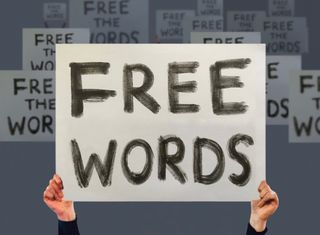Stuttering
Feared Words and Free Words
An ex-stutterer finds a cure in free speech, Part 1.
Posted April 5, 2019

“You can’t say that” is a phrase we hear more and more these days.
Recently, I was debating the contentious issue of free speech with a friend when I started stuttering (also known as stammering). It was only a few words, but it came as a shock, as I haven't stuttered since I was about fourteen. That's now thirty-six years ago, and a fair bit of speech therapy and psychiatric help has occurred since then.
I had been one of those severe stutterers who had a wide range of symptoms: syllable repetition, blocking, airflow trouble and "superfluous behaviours" like, lip-smacking, choking sensations, head thrusting and eyes rolling upwards. My stutter was a disability. It used to scare people.
After the recent minor episode, I found myself asking what could possibly have triggered it. Maybe it was a flashback to the ages between nine and twelve, at the time when my stutter was at its most traumatic.
It came to me that the idea of limits on speech, on banning words, that my friend was advocating for, were things that I must have found threatening on a personal level, perhaps because in my mind it was speech policing that caused my stutter in the first place. The idea that those who believed in free speech could somehow be "oppressing others" conflicted with my childhood experience, as it was language-police who had caused me to stutter, and it was free un-self-conscious speech that had finally cured me of my stutter.
My flashback stuttering episode, thirty-six years after my cure, is a reminder not just of the roots of the stuttering condition, but of how much our culture now takes free speech for granted. The stutterer does not live in a world of free speech, but in a world populated by "feared words": words which must be anticipated, avoided, erased, worried about and alternatives searched out across a mental map of all potential word-threats. The stutterer lives in a linguistic minefield, and sadly, the more self-conscious the stutterer becomes as the greater number of feared words increases, the more the stutterer is terrified of taking a verbal step forward and is frozen to the spot, gasping for words and for air.
The politically "sensitive" idea of constantly being on the look-out for "problematic words" which will then have to be replaced by socially acceptable words is a duplicate of the neurolinguistic behaviour of the stutterer. I can recall going through exactly this procedure in class at the age of 10 when I was asked to stand up and give an answer. I would run through my answer in my head, police it for difficult or feared words and then re-write and rehearse in my mind what I was going to say—all of this in panicked milliseconds, before attempting to speak. "Do not say THAT problem word," the mind said. "Replace it with a safer word."
Among many feared words, I had a deep fear of all words beginning with the letters P, M and W. In all speech, I had to use word-substitution and re-arrange words in a sentence to avoid words that began with these letters along with other words that I had stuttered over before. But the anxiety over certain words becomes a self-fulfilling prophecy. It is akin to performance anxiety—the more you obsess about a thing, the more the anxiety makes your performance worse.
Unfortunately, even in this day and age, popular remedies for stuttering on the internet include tips like “visualize the words you're going to say before you say them.” Such ill-informed "advice" only makes matters worse for the already painfully self-conscious stutterer.
Stuttering exacts a high emotional and psychological cost from the stutterer and impacts heavily on their ability to function in society. I can certainly attest to this. Kalinowski and Saltuklaroglu in their book, “Stuttering,” use the analogy of an iceberg, with the immediate visible effects of stuttering above the waterline and a much larger set of symptoms below the surface. I can cite feelings of shame, frustration, embarrassment, anger, and guilt as constants, with these feelings crystallizing into negative self-image, avoidance behaviours, depression, and self-harming behaviours.
As David Ward has said, “in stuttering, the severity of the disorder is seen as likely to increase when demands placed on the person speech and language system exceed their capacity to deal with these pressures… Demands may be increased by internal factors such as lack of confidence or self-esteem or inadequate language skills or external factors such as peer pressure, time pressure, stressful speaking situations, insistence on perfect speech, and the like.”
Barry Guitar explains how the fear of stuttering “may actually increase tensions and effort, leading to increased stuttering” in the manner of a positive feedback loop.
Apart from the fear of specific words and letters, there’s anxiety, self-imposed isolation, shame, low self-esteem and a body flooded with the "flight-or-fight" chemistry of cortisol and abnormally high adrenaline levels. These can have detrimental effects on neurological growth, physical growth, and mental health. Stutterers are also singled out for bullying. I use this cold, scientific language here to describe exactly what happened to me, perhaps to spare you graphic details or excessive emotion on my part, but also because of the degree of dissociation I experience when going back in time to that stuttering, bullied child who "is no longer me."
To trace back the origins of my stutter, I would say that I was pretty lucky. I was not born with a stutter but acquired it around the age of nine. “Only 18 percent of children who stutter after five years [old] recover spontaneously.” And I was one of that 18 percent.
My stutter seemed to have developed from two different strands. First, my father had a stutter all his life, so there was a genetic predisposition, but also his fear that I would “be cursed with his curse” became a pressure in itself that made me more afraid of stuttering.
On top of that were linguistic context conflicts. My father had started our family in a remote area of Scotland with a unique and very thick regional accent, very much at odds with the southern “Received Pronunciation” of my parent’s accents. My family was, in the derogatory language of the locals: “south mouthers” or “englishers.” So from day one in primary school, I had to perform the same act of verbal juggling that leads children to Bilingual stuttering—“mixing vocabulary from both languages in one sentence.” I recall having to stop and check words for their pronunciation—dog, in the local tongues was pronounced “dowg,” a girl was a “lasakie,” the grass in the garden was “gress in e’ gerdeen.” Pretty soon, failure to fit in with the local lingo resulted in teasing, then bullying, with a cost being exacted for saying the wrong words or saying the right words but with the wrong accent. This went as far, in one bullying session at around aged 10, as being held by a group of four boys (under the watchful gaze of a girl who they were showing off for), who forced me to say words in their accent and then either punched me or twisted my arms if I failed to pronounce them correctly. It was like an ironic subversion of elocution lessons. To teach a child with a BBC English accent to speak with a thick local northern Scottish accent. Punch by punch, policing every spoken word.
My fear of all words beginning with the letter P was to do with the fact that I had been nicknamed "Poof." Tragically, every time I stuttered over a P-word (getting stuck on repetitions of the letter P), the bullies took this as even more hilarious evidence that I was exactly what they said I was.
It is likely that the trauma from the many bullying events such as this led to Psychogenic Stuttering, although I believe that my father’s fear of my developing a stutter was also instrumental in escalating my condition. Against his good intentions, he accidentally created an atmosphere of paranoia around my every utterance. As I stuttered before him, I sensed I caused him great pain, as 'history was repeating.'
Simple hesitancy related primary stuttering very quickly escalates into the positive feedback loop in which fear of speech leads to escalating secondary stuttering behaviour. This increases dramatically when punishment is associated with speaking incorrectly. Or it did in my case.
But what of the cure and the neuroscience of "flow?"



